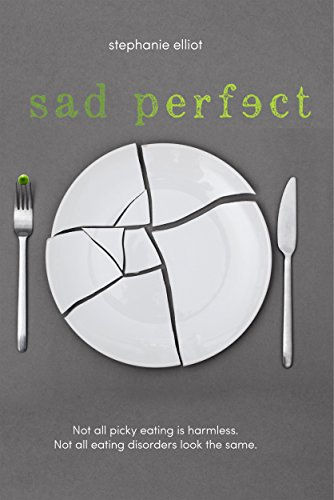Stephanie Elliot: 'Sad Perfect' and ARFID (Eating Disorders)
- Nov 21, 2023
- 3 min read
I never sat down at my computer and said to myself, “Hmm, I think I’ll write a fictional novel
about ARFID and what my daughter is going through because that sounds like a great use of my time! Heck, that even sounds fun!”
But I did do this, and while that time in our lives wasn’t fun, it was therapeutic and rewarding
all in its very own way.
My daughter McKaelen was 14 at the time, and had been struggling with something
surrounding food and eating ever since she was a toddler. Food scared her. She feared the idea of trying new foods and stuck to a small list of very basic beige and boring foods for all of her life. Plain bagels, frozen waffles, goldfish crackers, raw carrots, peanut butter, pizza with the cheese and sauce removed. Chocolate, cookies, cake, chips. That was about it.
Doctors chalked it up to picky eating and assured us that she would outgrow this. But I didn’t believe them, and around the time McKaelen was in middle school, she began isolating, avoiding, retreating from friends and family, and having thoughts she shouldn’t have been having. I knew we had to do something. And so we found an eating disorder program for her, where she was diagnosed with ARFID: Avoidant/Restrictive Food Intake Disorder.
ARFID differs from other eating disorders (EDs). There is no body image or self-esteem issues at play. People with ARFID don’t avoid/restrict eating because they want to change their bodies. The reason they don’t eat is because of the fear that they will choke or die from eating a food that, in their minds, they feel is unsafe or dangerous. As with all eating disorders, ARFID is also considered a mental health disorder.
Like all eating disorders, it’s a serious situation to find yourself in when you are either suffering
or you have a loved one suffering. While she attended this intensive outpatient therapy program (IOP) for four months, I wrote about the experience from the perspective of the whole family. I wrote about a girl who didn’t know what was wrong, but eventually discovered she had ARFID.
Back in 2014, if you googled “picky eating” or “selective eating disorder,” ARFID would not
populate in the search, because it did not exist on the internet. The acronym literally did not
appear anywhere online. Fortunately, nearly 10 years later, this is no longer the case, for which I am profoundly grateful. Professionals, therapists and eating disorder specialists now know the term and are finding treatable ways to help ARFID patients recover from what I call “Extreme Picky Eating.”
Through a terrific therapy program, McKaelen began her healing journey by working with a
nutritionist, a therapist who incorporated somatic experience therapy, a peer group, and one-
on-one counseling. As she worked through the program, I sat across the street in a coffee shop
and spewed out the story that would become Sad Perfect. While the story of Sad Perfect’s main character, Pea, is fictional, all aspects of what McKaelen and our family went through as it related to ARFID were true to our personal circumstances. Much of the dialogue in the novel was drafted from actual conversations we had in our family and with the doctors as we navigated through this unique eating disorder.
Through hard work, a huge time commitment, support of family and friends, and a program
that worked, McKaelen is now a thriving 24-year-old adult who has recovered completely from
ARFID.
I’m grateful that people are discovering more about ARFID and how to treat it; and I’m also
grateful that Sad Perfect has helped readers understand more about the disorder, and that it’s
also helped those with ARFID feel less alone in their journey. As an author of a story about
ARFID, I am also an advocate, and do what I can to help parents who reach out to me. It is my
goal in writing Sad Perfect and in being a voice for the ARFID community to help others not feel ashamed or alone as they navigate through a very serious, but also treatable eating disorder.
I am always available at stephanieelliot@gmail.com to help.

Stephanie Elliot is the author of the young adult novel, Sad Perfect, and is a frequent writer and speaker on ARFID, the eating disorder at the heart of her book. Her work has been featured in Romper, CafeMom, SheKnows, Your Teen, NEDA, Parents, HuffPo, and more. She is currently
publicity manager for Megan Beatie Communications. Stephanie has three adult children and lives in Scottsdale, Arizona with her husband. Learn more about Stephanie at www.stephanieelliot.com and about ARFID and her family's journey at
https://stephanieelliot.wixsite.com/arfid. IG: @stephanie.elliot
Further Reading on ARFID
FICTION: There is a new middle grade novel dealing with ARFID: FOOD FIGHT, by Linda B. Davis (Fitzroy Books, 2023). (If you know of any other children's title on this topic, please drop it below in the comments section!)
NON-FICTION/INFO RESOURCES: 1. The Child-Mind Institute offers good starting information on ARFID here. 2. Stephanie's ARFID website contains a wealth of info as well.





Wow, that's such a raw and real story. Turning something so tough into a book? Seriously impressive. It's like, you tackled a huge problem head-on. Reminds me how sometimes, you gotta break down big challenges into smaller, manageable steps, right? Like, even with those crazy management assignments. If anyone's feeling swamped with those, maybe some management assignment help could be a good shout? Just throwing it out there.
Kaiser OTC benefits provide members with discounts on over-the-counter medications, vitamins, and health essentials, promoting better health management and cost-effective wellness solutions.
Obituaries near me help you find recent death notices, providing information about funeral services, memorials, and tributes for loved ones in your area.
is traveluro legit? Many users have had mixed experiences with the platform, so it's important to read reviews and verify deals before booking.